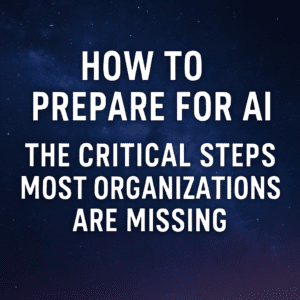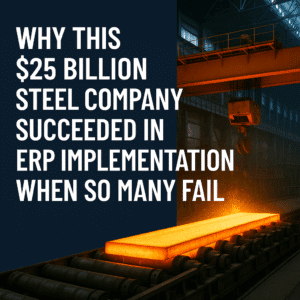In the world of enterprise resource planning (ERP), a successful implementation can streamline operations, improve efficiency, and provide a strong return on investment. However, when things go wrong, the consequences can be disastrous, as evidenced by one of Europe’s largest city councils. This council embarked on an ambitious ERP implementation, budgeting £20 million for the project. Instead, they ended up spending a staggering £115 million, only to find that the new system was unusable. This case serves as a cautionary tale, illustrating what can happen when an ERP project goes off the rails. Let’s explore the reasons behind this failure and discuss how organizations can avoid similar pitfalls.
Table of Contents
ToggleThe Risk of Replacing a Long-Established System
The city council’s decision to replace its long-established SAP system with Oracle Fusion marked a significant shift. The SAP system had been in place for over 20 years, during which time the organization had developed deep-rooted competencies and processes around it. When you’ve been using a system for decades, replacing it is never just about swapping one technology for another. It involves uprooting a deeply embedded system, along with the processes, culture, and competencies built around it.
The council’s situation underscores a critical point: transitioning from a well-entrenched system to a new one is inherently risky. The shift from SAP to Oracle Fusion wasn’t just a technical upgrade; it represented a complete overhaul of how the council operated. Oracle Fusion, while powerful, is fundamentally different from SAP in terms of functionality, user interface, and underlying technology. This drastic change required not only new software but also a cultural shift within the organization—a challenge that was underestimated from the start.
Understanding Digital Maturity and Its Impact
Digital maturity refers to an organization’s ability to leverage modern technologies effectively. In this case, the council’s digital maturity—or lack thereof—played a significant role in the project’s downfall. An organization with high digital maturity is typically more adept at adopting new technologies, as it has already cultivated a culture of innovation and a robust IT infrastructure. Conversely, an organization with low digital maturity, especially one rooted in older technologies and resistant to change, will face greater challenges when adopting a new system.
For the city council, their long reliance on SAP suggested a lower level of digital maturity. The entrenched nature of their processes and systems likely made it difficult for them to adapt to the new Oracle Fusion environment. This lack of digital maturity would have required a more gradual, carefully managed transition—something that wasn’t factored into the original plan. It’s a reminder that understanding an organization’s digital maturity is crucial when planning an ERP implementation. Failure to do so can lead to unrealistic timelines, underestimated costs, and ultimately, project failure.
The Crucial Role of Project Governance
Project governance is the framework that ensures a project is properly managed and stays on track. In this case, the city council’s project governance was found lacking, which contributed significantly to the failure. Effective project governance requires clear leadership, well-defined roles, and regular oversight to manage risks and keep the project aligned with its goals. Unfortunately, it appears that the council’s governance structure did not meet these standards.
One of the red flags in this project was that the council’s CEO only became involved after the project had already gone off track. This delayed involvement suggests that the project may not have had sufficient executive oversight from the outset. While the CEO doesn’t need to be involved in day-to-day project management, their role in setting strategic direction and ensuring that the project aligns with organizational goals is critical. The lack of early involvement at this level likely contributed to the project’s drift, leading to escalating costs and a lack of alignment with the council’s needs.
The Dangers of Customization
Customization is often seen as a way to tailor an ERP system to an organization’s specific needs. However, it comes with significant risks. In the council’s case, they attempted to replicate their highly customized SAP environment within Oracle Fusion. This decision to heavily customize the new system was a major risk factor, as it increased complexity, extended timelines, and raised costs.
Customization can also mask a deeper issue: resistance to change. When an organization is too attached to its old ways of working, it may seek to bend the new system to fit old processes, rather than embracing the new system’s best practices. This resistance can lead to excessive customization, which not only increases costs but also makes the system harder to maintain and upgrade in the future. In this case, it seems that the council’s insistence on customization was driven by a reluctance to adapt to Oracle Fusion’s standard processes, resulting in a more complex and costly implementation.
Revising the Business Case: A Sign of Trouble
As the project progressed, the city council began revising its business case, repeatedly lowering the expected benefits and increasing the budget. This is a clear indication that the project was not delivering as promised. Adjusting a business case mid-project is often a sign that the initial estimates were overly optimistic or that the project is encountering significant issues.
A realistic business case is the foundation of any successful ERP implementation. It should provide a clear understanding of the costs, benefits, and risks involved. In this case, the fact that the business case had to be revised so frequently suggests that the council did not have a firm grasp on these factors from the start. It’s also possible that the original business case failed to account for the full impact of potential disruptions, such as the inability to run financials or complete audits, which the council ultimately faced.
Preparing for Operational Disruption
One of the most critical, yet often overlooked, aspects of ERP implementation is preparing for operational disruption. What happens if the new system doesn’t work as expected? What if you can’t close the books, run payroll, or process orders? These are not just hypothetical questions—they are very real risks that can have devastating impacts on an organization.
For the city council, the inability to use the new system for essential functions like financial reporting and audits was a major blow. This situation could have been mitigated with more thorough testing, better change management, and a more conservative approach to going live. Organizations need to consider the potential cost of operational disruptions when planning an ERP project, and weigh that against the cost of additional time and resources to ensure the system is fully functional before going live.
Lessons Learned: Avoiding ERP Disaster
This case serves as a stark reminder of the challenges and risks associated with ERP implementations, especially for large, complex organizations. The city council’s failure was not the result of a single mistake, but rather a series of missteps that compounded over time. From underestimating the complexity of replacing a long-standing system, to failing to properly manage the project, to over-customizing the new software, each of these factors contributed to the ultimate failure of the project.
For other organizations embarking on an ERP journey, the lessons are clear:
- Understand the scope of the change: Replacing a long-established system is not just a technical upgrade, it’s a complete transformation that requires careful planning and management.
- Assess your digital maturity: Recognize where your organization stands in terms of digital maturity, and plan your ERP implementation accordingly. Lower maturity often means a longer, more complex, and costlier project.
- Prioritize project governance: Ensure strong project governance from the start, with active involvement from senior leadership to keep the project aligned with business objectives.
- Be cautious with customization: Avoid excessive customization, which can increase costs and complexity. Instead, focus on adapting your processes to the new system’s best practices.
- Prepare for operational disruption: Consider the potential impact of the new system on your operations, and plan for contingencies to avoid major disruptions when going live.
By keeping these lessons in mind, organizations can better navigate the challenges of ERP implementation and avoid the costly mistakes made by this city council.

How Can We Help with your Business Transformation
At Third Stage Consulting, we are passionate about empowering organizations to successfully navigate the complexities of digital transformation. Whether you’re embarking on a new transformation journey or aiming to optimize your current processes, our expert team is committed to providing comprehensive support throughout every phase. From initial strategy development to execution and beyond, we work closely with you to ensure that your transformation goals are met efficiently and effectively.





